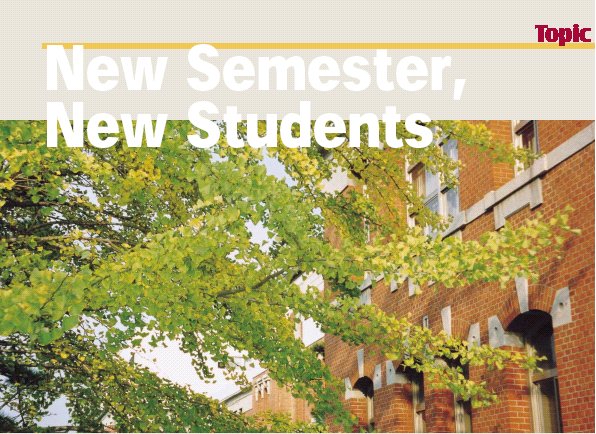

This October, Kyudai welcomed 197 international students from 46 countries. These students are now studying at Kyudai as research students, Special Course students, short course (Japan in Today's World:JTW) students and Preliminary Japanese Training Course students etc. In November 1999, Kyudai had 808 international students, and since then, the number has been increasing by 8% per year. This October, the number finally reached 1000, with a significant increase of Chinese students.
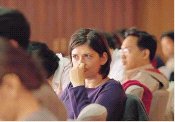
Courses and programs start in October Special Courses at the Graduate Schools: Graduate courses taught in English in the Graduate Schools of Law, Engineering, Bioresource and Bioenvironmental Sciences and the Interdisciplinary Graduate School of Engineering Sciences. Short Course for Foreign Students (JTW): A short-term multi-disciplinary course taught in English, offered by the International Student Center. Preliminary Japanese Training Course: A Japanese language course for students who are about to enter a university, offered by the International Student Center. Training in Japanese Language and Culture Course: A one-year exchange program offered by corresponding schools and the International Student Center.
What Kyudai does for international students (1) Orientation for Freshmen
Twice a year in April and October, the International Student Exchange Division conducts orientation sessions for incoming freshmen about the following topics.
1) Introduction of Kyushu University by video tape
2) The work of the International Student Center
3) Function and Events of Kyushu University Foreign Students Association (KUFSA)
4) Immigration, visas, and permits
5) Guidance for traffic safety
6) Financial and Housing supports from the Fukuoka International Association
(2) Welcome party
On October 17, a welcome party for all the incoming freshmen (including the students who enrolled this April) was held at the Fukuoka Recent Hotel. The 360 participants included students, guests from international exchange division in Fukuoka City and Fukuoka Prefecture, international students supporting organizations, President Kajiyama and the faculty and staff of Kyudai in charge of international students. The friendly party mood was set by the performance of traditional Japanese music, such as the koto (Japanese harp), and the syakuhachi (bamboo flute).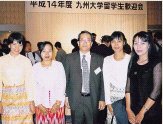
Photo: Professor Kubota,
Faculty of Agriculture
(center) and new students
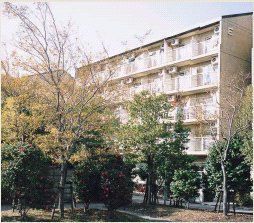
(3) International House (Kaikan) Charity Bazaar
Charity bazaars are held several times a year at the Kaikan. This is one of the support schemes for international students, and the items sold are home electric appliances, and bedclothes etc., which are necessary for daily life. Most of them are gifts from citizens, and they are separated into two categories; one is for the new students coming into the Kaikan, and the other is for the students leaving Kaikan. For the new students, the bazaars are held twice a year, one week from the first Saturday in April and October. The items sold are mainly dishes, pans, convenience goods, and bedclothes, and prices are set very low, starting from a mere 10 yen! For the students leaving the Kaikan, furniture, home electric appliances, and bedclothes etc. are sold every Friday afternoon. The proceeds from the bazaars are used for the student activities in Kaikan, like the Kaikan Welcome Party and the Kaikan Matsuri.
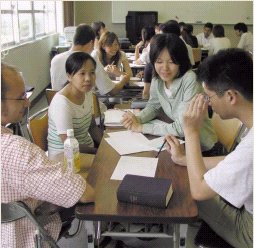
(4) Academic Advisor
Academic advisors provide guidance and advice to students with respect to study plans and personal problems. When students are worried or confused about something, they listen and help the student.
(5) Tutorial System
Every international student can be assigned a tutor with whom a student can discuss matters concerning his/her daily life or study, which helps students become more accustomed to college life in Japan.
This system is available for the first year at the University. For undergraduate students, it may be available for two years.
(6) Counseling
Counseling about study, accommodations, visa permission, accident, illness or other family concerns (Japanese language course for family or children's entrance to school) is offered at the Kaikan and the International Student Center Annex. Students can ask for counseling anytime they have difficulties.
International House (Kaikan): Phone (092) 681-3061
International Student Center Annex: Phone (092) 642-2156
For more information about studying at Kyudai, please visit:
http://www.kyushu-u.ac.jp/english/index-e.htm
Hello from a new student
Month#1: Wonderfully Confusing
Ryan Sydnor,
JTW Student
(University of Wisconsin-Madison)
I was sleep-deprived, dehydrated, slightly nervous. As I stepped through the gate, reality seemed warped------somehow less real than it had been on the airplane. I wasn't sure of how to get my luggage------let alone what to do once I did get it------but such concerns were overshadowed by the thought, "God, I'm actually in Japan." I just floated in a daze from each moment to the next, assuming that everything would fall into place somehow.
When I saw a group of smiling people and a sign that read, "KYUSHU UNIVERSITY JTW PROGRAM," I had a feeling that everything had already fallen into place. I was pleasantly surprised when they applauded me (something I've learned they really like to do here) and a friendly-looking little guy introduced himself as Nori, my tutor. They seemed so happy to see me, and I was so grateful to see them, it was like a reunion with a bunch of relatives... except that they were Japanese people I had never met in my life. From that point, it didn't take long for me to understand why I had been so strongly urged to enter the JTW program.
My first month in this country contained more new experiences than had the entire year preceding it. For the first two weeks, I felt as if I were hovering alongside whoever was actually living through it all. It was like watching myself on a "reality" show... which is ironic, since none of it felt real. I guess it was more like watching myself in a cartoon.
By now, the "hovering" feeling has passed. Although it often still feels like a bizarre cartoon, I have somehow accepted the cartoon as my life. Things that were at first alien to me have already become familiar, and complete strangers have become close friends. I know exactly how to respond when the convenience store clerk asks me, "Atatamemasuka?" I know not to pour my own beer, leave my chopsticks protruding from a mound of rice, or attempt to pay bus fare with a new ¥500 coin.
That is not to say that I understand this country yet. I find myself at least mildly confused for a large portion of each day. When I'm not staring blankly at someone trying to speak to me in Japanese, I am still continually faced with reminders that I'm not in Wisconsin anymore. Music plays when it's okay to cross the street. I have to put on tiny slippers before entering the engineering laboratory. At any given time, a female voice may come forth with instructions of some sort - from the bus, from the cash machine, from the elevator, from the ceiling of the train, from a passing ambulance, from an automatic gate... I don't find Cheetos or Fig Newtons at the convenience store. I find rice balls wrapped in seaweed. I find bags of salty beans with "Hey! Come on, let's begin joyful talking!" printed on the packages. And I always feel HUGE.
None of this confusion makes me yearn for home, however; it makes me even more thankful to be here. I wouldn't have wanted life in Japan to be any other way.
Nice to live in Japan
Ridanto Eko
Poetro
I am Ridanto Eko Poetro, currently a junior lecturer at Bandung Institute of Technology (ITB), Indonesia. My interest is in space engineering, despite the fact that the Indonesian space program is still far from putting a satellite into Earth orbit. As Japan is one of the leading countries in space technology, and Kyushu University is one of the Japanese universities conducting space-engineering research, I am sure that I will be able to gain much knowledge here to be implemented in Indonesia in the future. The first time I came to Japan, I expected that I wouldn't be able to get around easily without perfectly mastering the Japanese language. However, this is not true, Japanese people are very kind and helpful, even when I can not say any words other than hai and iie. By the way, after completing the Japanese Language Intensive Course, I am now a research student at SSDL (Space System Dynamics Laboratory). I am supposed to be getting prepared for next year's doctor course entrance examination. Now I am going for it, supervised by Professor Tetsuo Yasaka.